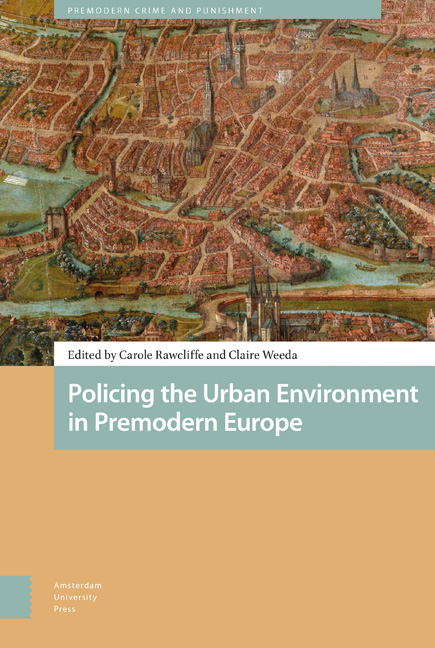Book contents
- Frontmatter
- Contents
- List of Illustrations
- List of Figures and Charts
- Introduction
- 1 Cleanliness, Civility, and the City in Medieval Ideals and Scripts
- 2 The View from the Streets: The Records of Hundred and Leet Courts as a Source for Sanitary Policing in Late Medieval English Towns
- 3 Urban Viarii and the Prosecution of Public Health Offenders in Late Medieval Italy
- 4 Food Offenders: Public Health and the Marketplace in the Late Medieval Low Countries
- 5 Policing the Environment of Late Medieval Dordrecht
- 6 Muddy Waters in Medieval Montpellier
- 7 Regulating Water Sources in the Towns and Cities of Late Medieval Normandy
- 8 Policing the Environment in Premodern Imperial Cities and Towns: A Preliminary Approach
- 9 Official Objectives of theVisitatio Leprosorum: Ambiguity, Ambivalence, and Variance
- Index
5 - Policing the Environment of Late Medieval Dordrecht
Published online by Cambridge University Press: 21 November 2020
- Frontmatter
- Contents
- List of Illustrations
- List of Figures and Charts
- Introduction
- 1 Cleanliness, Civility, and the City in Medieval Ideals and Scripts
- 2 The View from the Streets: The Records of Hundred and Leet Courts as a Source for Sanitary Policing in Late Medieval English Towns
- 3 Urban Viarii and the Prosecution of Public Health Offenders in Late Medieval Italy
- 4 Food Offenders: Public Health and the Marketplace in the Late Medieval Low Countries
- 5 Policing the Environment of Late Medieval Dordrecht
- 6 Muddy Waters in Medieval Montpellier
- 7 Regulating Water Sources in the Towns and Cities of Late Medieval Normandy
- 8 Policing the Environment in Premodern Imperial Cities and Towns: A Preliminary Approach
- 9 Official Objectives of theVisitatio Leprosorum: Ambiguity, Ambivalence, and Variance
- Index
Summary
Abstract
An important Dutch trading centre, Dordrecht experienced considerable population growth and many environmental challenges during the later Middle Ages. Surviving administrative, financial, and legal records help us to establish which bylaws were implemented, and the extent to which conflicts reached the courts. We can document official policies regarding urban space, sanitation, and nuisances, while also determining the responsibilities of residents in matters of public health. Magistrates often reissued regulations concerning the construction of buildings, the disposal of rubbish and offal, and public morality and safety, while a variety of officials monitored compliance, imposing on-the-spot fines when necessary. Since Dordrecht's wealth derived from trade, disturbances, dirt, and the diseases, fires, and floods that suggested divine displeasure could threaten its prosperity.
Key words: environment; Dordrecht; infrastructure; sanitation; litigation
As Dordrecht and other cities in the Low Countries obtained civic rights (stadsrecht) and became densely populated in the later Middle Ages, the need arose to formalize customary rules by recording them in books and introducing new bylaws. These urban bylaws addressed multiple issues that were related to the organization of daily life, including the regulation of the environment and public health, alongside economic, social, and political affairs. As legislators, city governments, such as that of Dordrecht, thereby obtained the judicial and legislative means to police the urban environment, in a bid to shape and improve it.
In today's popular culture, as we can see in many films and books, late medieval societies are still often portrayed as superstitious and backward. From this perspective, city governments would have been incapable of establishing efficient sanitation and waste disposal systems, the absence of which would have resulted in filthy living conditions. Henk 't Jong has deconstructed these misconceptions in the context of several late medieval cities in Holland, including Dordrecht. Following Thorndike and Sabine, he has argued that, when analysing bylaws, it is important to consider the process through which customary law evolved into more formal collections of regulations. However, he maintains that there are relatively few entries concerning environmental bylaws and violations thereof in the administrative sources from Holland. Public hygiene was apparently not one of the main legislative concerns of late medieval city governments.
- Type
- Chapter
- Information
- Policing the Urban Environment in Premodern Europe , pp. 149 - 178Publisher: Amsterdam University PressPrint publication year: 2019



